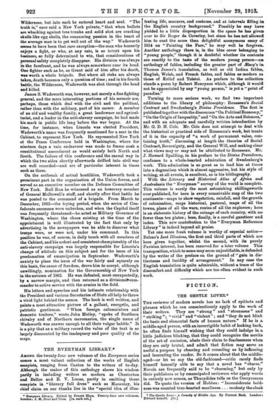THE EVERYMAN LIBRARY.* Axone the twenty-four new volumes of the
Everyman series comes a moat valiant collection of the works of English essayists, ranging from Caxton to the writers of to-day. Although the maker of this anthology shows his wisdom partly in including writers so modern as Chesterton and Belloc and E. V. Lucas, partly in omitting those essayists in "literary full dress" such as Macaulay, his chief claim on our thanks lies in the "special idea of illus-
• Everyman Library. Edited by Ernest Ebys. Twenty-four new volumes. London: J. Id. Dent and Eons. Lis. each net.]
trating life, manners, and customs, and at intervals filling is the English country background." Possibly he may have yielded to a little disproportion in the space he has givers over to Sir Roger de Coverley, but since be has not allowed him to oust the more than delightful anonymous essay of 1614 on "Painting the Face," he may well be forgiven..
Another anthology there is, in the blue cover belonging to "young people," though it is doubtful whether its contents are exactly to the taste of the modern young person—an anthology of fables, including the greater part of .sop's in Thomas James's translation, as well as old Indian fables, English, Welsh, and French fables, and fables as modern as those of Krilof and Tolstoi. As preface to the collection stands a poem by Robert Henryson which, although it would not be appreciated by any "young person," is yet a "point of paradise."
Turning to more serious work, we find two important additions to the library of philosophy : Rousseau's Social Contract and Swedenborg's Divine Providence. The first is published together with the discourses "On Political Economy," " On the Origin of Inequality," and "On the Arts and Sciences," and with an adequate and carefully written introduction by Mr. G. D. H. Cole. Mr. Cole does not attempt to deal with the historical or practical side of Rousseau's work, but treats of it in the capacity of "a work of permanent value, con- taining truth," discussing at length the theories of Social. Contract, Sovereignty, and the General Will, and making clear what views may or may not be attributed to Rousseau. Mr.. J. Howard Spalding, in his preface to the Divine Providence, confesses to a whole-hearted admiration of Swedenborg's work. This admiration is so great as to lead him at times into a dogmatism which is almost aggressive, but his style of writing, at all events, is excellent, as is his bibliography.
With the Literary and Historical Atlas of Africa aria Australasia the " Everyman" survey of the world is complete. This volume is surely the most astonishing shillingsworth ever published, for here is every conceivable map of the two continents—maps to show vegetation, rainfall, and the growth of colonisation, maps historical, pastoral, maps of all the towns, plans of all the wars, routes of all the explorers; here is an elaborate history of the coinage of each country, with no fewer than ten plates ; here, finally, is a careful gazetteer and index. This new contribution to the " Everyman Reference Library " is indeed beyond all praise.
Yet one more fresh volume is worthy of especial notice- Balzac's Lost Illusions, the first and third parts of which are here given together, whilst the second, with its purely Parisian interest, has been reserved for a later volume. This transposition, which to some may seem unjustifiable, is defended by the writer of the preface on the ground of " gain in dis- tinctness and lucidity of arrangement." In any case the English translation is quite admirable, without a trace of the discomfort and difficulty which are too often evident in such work.


















































 Previous page
Previous page